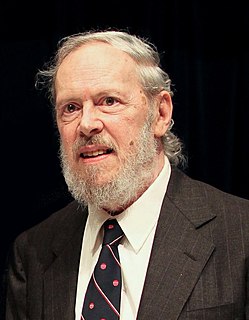Top 54 Quotes & Sayings by Dennis Ritchie
Explore popular quotes and sayings by an American scientist Dennis Ritchie.
Last updated on April 14, 2025.
The first phase of C was - really, it was two phases in short succession of, first, some language changes from B, really adding the type structure without too much change in the syntax, and doing the compiler. The second phase was slower; it all took place within a very few years, but it was a bit slower, so it seemed.
Obviously, the person who had most influence on my career was Ken Thompson. Unix was basically his, likewise C's predecessor, likewise much of the basis of Plan 9 (though Rob Pike was the real force in getting it together). And in the meantime Ken created the first computer chess master and pretty much rewrote the book on chess endgames. He is quite a phenomenon.





















